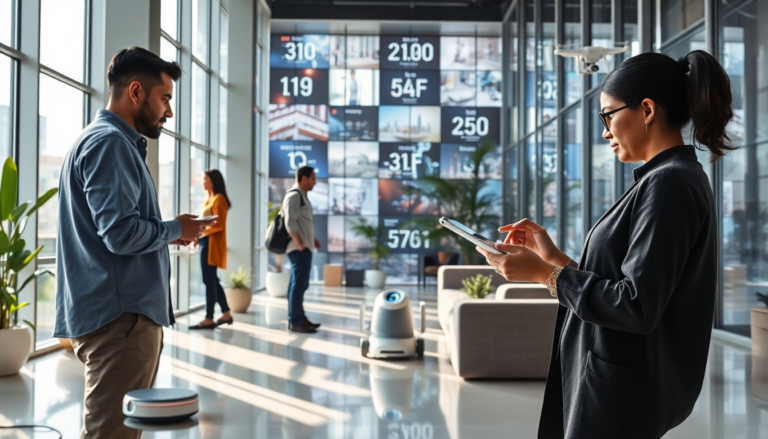Argomenti trattati
Artificial Intelligence (AI) has come a long way since its early days in research labs. Today, it’s woven into the very fabric of our daily lives—shaping our homes, workplaces, healthcare systems, and entertainment choices. As we approach 2025, AI is no longer just a concept from science fiction; it’s a powerful force revolutionizing how we operate, learn, and connect with one another. In this article, we’ll explore the significant AI trends that are not only shaping our future but also altering various sectors in ways we couldn’t have imagined.
AI in Healthcare: Revolutionizing Patient Care
When you think about the most exciting applications of AI, the healthcare sector certainly stands out. It’s not just about automating processes; it’s about fundamentally enhancing the quality of care. Imagine AI systems that can perform real-time diagnostics based on imaging tests like X-rays and MRIs, providing insights that can lead to earlier interventions. In fact, technologies such as Google’s DeepMind are already detecting conditions like cancer and diabetic retinopathy with accuracy that often surpasses human practitioners. Isn’t that fascinating?
But that’s not all—AI is also reshaping surgical procedures. Picture surgeons using AI-powered robots for minimally invasive surgeries, resulting in greater precision and quicker recovery times. Plus, the integration of AI in monitoring patient health is a game-changer. Algorithms can predict potential complications before they arise, allowing for timely, proactive care. Who wouldn’t want that kind of peace of mind?
Of course, these advancements don’t come without challenges. Issues surrounding data privacy and algorithmic bias must be addressed to ensure responsible implementation of AI in healthcare. The ultimate goal is to create a system where AI enhances human decision-making without compromising ethical standards.
AI in Creative Industries: Empowering Artists and Innovators
The creative landscape is undergoing an exciting transformation thanks to Generative AI technologies. Tools like GPT-5 and MidJourney empower creators to produce high-quality content—whether it’s music, art, or marketing campaigns—in just minutes. This democratization of creativity is allowing individuals, regardless of their resources, to create professional-level work. Isn’t it amazing how technology can level the playing field?
For instance, consider a YouTuber who can generate entire video scripts and edits using AI in a single afternoon. Musicians are collaborating with AI to create tracks that blend human emotion with machine precision. This fusion of human creativity and AI capabilities is redefining the creative process itself. But as we embrace these advancements, we must ask ourselves: what does this mean for ownership and originality? The rise of AI-generated content calls for clear guidelines and ethical considerations in the creative domain.
AI in the Workplace: Redefining Productivity
The impact of AI on workplace dynamics is nothing short of profound. By 2025, remote work will have evolved from a trend into a new norm, largely driven by AI tools that streamline communication and enhance productivity. Can you imagine starting your day with an AI assistant that organizes your meetings, captures notes in real-time, and suggests actionable items—all before you’ve even finished your morning coffee?
AI is automating those repetitive tasks that often bog down employees, allowing them to focus on strategic thinking and innovation instead. For companies, this means improved efficiency and reduced operational costs. Leaders can leverage AI analytics to gauge team productivity and make informed decisions about resource allocation. Sounds like a win-win, right?
However, as we continue to weave AI into our work environments, fostering a culture that values human creativity and emotional intelligence alongside technological advances is crucial. The future of work isn’t just about automation; it’s about collaboration between humans and machines.
Conclusion: The Future of AI and Its Global Impact
The trends we’re witnessing today in AI are merely the tip of the iceberg. As AI continues to evolve, its integration into various aspects of life will deepen, shaping how we interact with technology and each other. The future holds exciting possibilities, but it also comes with the responsibility of ensuring that innovation prioritizes ethical considerations and social equity.
In conclusion, the AI revolution is not just about technology; it’s about how we choose to shape our future. By embracing these changes with an open mind and a critical eye, we can ensure that AI serves as a tool for enhancing human potential, rather than a replacement. The journey of AI is a collective one, and it’s up to all of us to steer it in a direction that benefits society as a whole.

